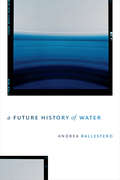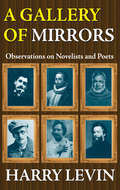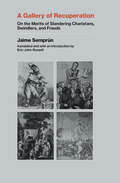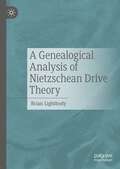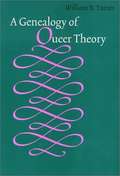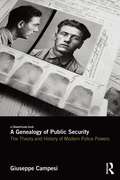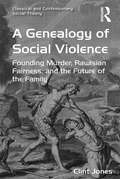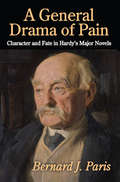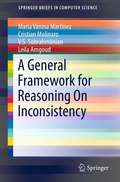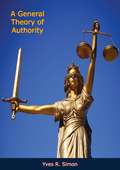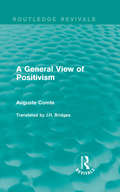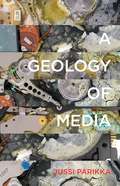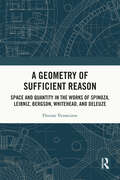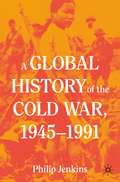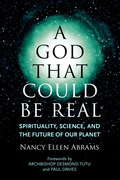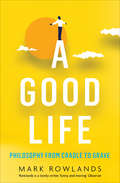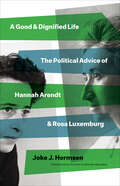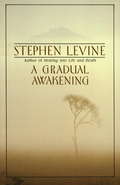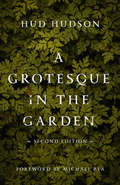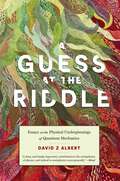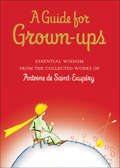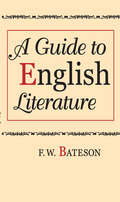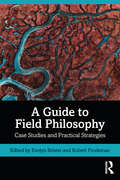- Table View
- List View
A Future History of Water
by Andrea BallesteroBased on fieldwork among state officials, NGOs, politicians, and activists in Costa Rica and Brazil, A Future History of Water traces the unspectacular work necessary to make water access a human right and a human right something different from a commodity. Andrea Ballestero shows how these ephemeral distinctions are made through four technolegal devices—formula, index, list and pact. She argues that what is at stake in these devices is not the making of a distinct future but what counts as the future in the first place. A Future History of Water is an ethnographically rich and conceptually charged journey into ant-filled water meters, fantastical water taxonomies, promises captured on slips of paper, and statistical maneuvers that dissolve the human of human rights. Ultimately, Ballestero demonstrates what happens when instead of trying to fix its meaning, we make water’s changing form the precondition of our analyses.
A Gallery of Mirrors: Observations on Novelists and Poets
by T. TregearThe essays in this classic volume range from broad concerns with critical theory and aesthetic formulation to specific analysis of forms and texts. Levin discusses such matters as the symbolic interpretation of literature, the development of literary criticism during the past half-century, European attitudes toward contemporary American writers, and re-evaluations of Joyce, Proust, Balzac, Cervantes, Melville, and Hemingway. Because Levin is both a learned scholar and imaginative critic, there is no comparable book that offers the wit, taste, and learning one finds in these pages. His historical and comparative approaches to literary theory enable Levin to place a given work precisely by relating it to other works and manifestations of culture. World literature is not the province of this work. But Levin views it as the horizon against which our own traditions may be measured. Just as anthropologists discover similar processes working through diverse cultures, so through can we glean understanding of common patterns through the analysis of world literature, our own peculiarly specialized branch of the science of man. The effect of convention, in shaping the extent to which literature may be conceived as an institution, has been widely discussed. A Gallery of Mirrors raises theoretical questions that touch the methodology of humanistic scholarship, with regard to other disciplines, and the status of art, with regard to other modes of knowledge. With changing schools of critical thought, Levin relies considerably on semantics as a precision instrument for defining concepts in the terms of those for whom they were most meaningful.
A Gallery of Recuperation: On the Merits of Slandering Charlatans, Swindlers, and Frauds
by Jaime SemprunThe first English translation of the French cult classic that lampoons France&’s most popular intellectuals of the post-1968 period and their ideas, which became forces of counterrevolution.Eric-John Russell&’s translation of Jaime Semprún&’s brutal takedown of France&’s best-known intellectuals of the post-1968 period, A Gallery of Recuperation, is one of the first full English versions of any of Semprún&’s books. Originally titled Précis de recuperation, the book is a scathing critique of ten major thinkers, including Michel Foucault, Gilles Deleuze, Jean-François Lyotard, and Cornelius Castoriadis. Semprún uses this catalog of careerism to reflect on the concept of recuperation—capitalism&’s uncanny ability to coopt anticapitalist critiques and subvert subversion. His central question: What happens to revolutionary ideas, including Marxism itself, in the hands of professional intellectuals?Semprún&’s idiosyncratic and playful style of polemics takes existentialism, humanism, structuralism, poststructuralism, postmodernism, aesthetics, and psychoanalysis to task, casting new light on the figures who have become dominant staples of modern Anglophone academia, and proving the necessity of critiquing intellectuals&’ roles within contemporary capitalism. A cult classic among the French radical left and scholars of the Situationist International and May 1968, A Gallery of Recuperation never made the impact it should have. Russell&’s translation marks a major step in recognizing Semprún&’s work beyond its French context.
A Genealogical Analysis of Nietzschean Drive Theory
by Brian LightbodyNietzsche’s “drive theory”, as it is referred to in the secondary literature, is a rich, unique and fascinating articulation of the human condition. In broad brushstrokes, Nietzsche appears to contend that all human psychology is either directly reducible to animal drives (e.g. sex, aggression) or indirectly explicable to the historical transformations thereof (e.g. ressentiment). Moreover, Nietzsche’s initial elucidation of drive theory in On the Genealogy of Morals (and elsewhere) is well-complemented with a fecund, profound, and clear elucidation of the concept in the secondary literature. Yet, there remains a glaring lacuna for all the discussion of drive theory in the scholarship. The secondary literature is delinquent in explaining how animal drives became incorporated to form the human psyche. Nietzsche’s account to elucidate how drives became “digested” or in his words “inpsychated” is called the Internalization Hypothesis. However, as it appears in GM: II, 16, the hypothesis is grossly inchoate. The result of this undertheorization is manifold; its deleterious effects resonate along many axes of Nietzsche’s philosophy. The present book, Internalized Valuation: A Genealogical Analysis of Nietzschean Drive Theory, offers an original and fruitful interpretation of Nietzsche’s philosophical psychology. First, it clarifies what drives are. Second, it provides a new way of thinking about Nietzsche’s genealogical methods and then applies these insights to The Genealogy itself. What follows is a work that not only sheds much-needed light on Nietzsche’s philosophy of mind in general and his theory of emotions in particular, but also informs and illuminates problematic passages of Nietzsche’s Genealogy.
A Genealogy Of Queer Theory (American Subjects)
by William B. Turner<p>Who are queers and what do they want? Could it be that we are all queers? Beginning with such questions, William B. Turner's lucid and engaging book traces the roots of queer theory to the growing awareness that few of us precisely fit standard categories for sexual and gender identity. <p>Turner shows how Michal Foucault's work contributed to feminists' investigations into the ways that power relates to identity. In the last decades of the twentieth century, feminists were the first to challenge the assumption that a claim to universal identity -- the white male citizen -- should serve as the foundation of political thought and action. Difference matters. Race, ethnicity, class, gender, and sexuality interact, producing a wide array of identities that resist rigid definition and are mutable. By understanding the notion of transhistorical categories -- woman, man, homosexual, and so forth -- feminist and gay male scholars launched queer theoretical work as a new way to think about the politics of gender and sexuality. <p>A Geneology of Queer Theory probes the fierce debates among scholars and activists, weighing the charges that queer readings of texts and identity politics do not constitute and might inhibit radical social change. Written by a historian, it considers the implications of queer theory for historical inquiry and the distinction between philosophy and history. As such, the book will interest readers of gay/lesbian/bisexual/transgender studies, intellectual history, political theory, and the history of gender/sexuality.</p>
A Genealogy of Public Security: The Theory and History of Modern Police Powers
by Giuseppe CampesiThere are many histories of the police as a law-enforcement institution, but no genealogy of the police as a form of power. This book provides a genealogy of modern police by tracing the evolution of "police science" and of police institutions in Europe, from the ancien régime to the early 19th century. Drawing on the theoretical path outlined by Michel Foucault at the crossroads between historical sociology, critical legal theory and critical criminology, it shows how the development of police power was an integral part of the birth of the modern state’s governmental rationalities and how police institutions were conceived as political technologies for the government and social disciplining of populations. Understanding the modern police not as an institution at the service of the judiciary and the law, but as a complex political technology for governing the economic and social processes typical of modern capitalist societies, this book shows how the police have played an active role in actually shaping order, rather than merely preserving it.
A Genealogy of Social Violence: Founding Murder, Rawlsian Fairness, and the Future of the Family (Classical and Contemporary Social Theory)
by Clint JonesExamining the mimetic theory of René Girard, this book investigates the development of society as a result of an original crime (a murder) that shaped the way the earliest humans organized the social structures we live with today - an analysis that reveals the dangerous structure of the most basic social relationships. With attention to family relationships, A Genealogy of Social Violence sheds light on the processes by which the traditional nuclear family, through the mimetic behaviour of children, embeds violence into human desires and hence society as whole. Challenging the thought of Girard and of Rawls in order to offer a new understanding of justice, this book suggests that in order to achieve a more peaceful society, what is required is not the self-defeating narrative of equality, developed in order to manage the violence engendered by our social institutions, but a reconceptualisation of the nuclear family structure. A striking critique of modern society, which draws on religion, mythology, literature, history, philosophy and political theory, A Genealogy of Social Violence will be of interest to social and political theorists, as well as philosophers working in the area of contemporary social and European thought.
A General Drama of Pain: Character and Fate in Hardy's Major Novels
by Bernard J. ParisThis motivational analysis of the protagonists in Thomas Hardy's three most widely read novels--Tess of the d'Urbervilles, The Mayor of Casterbridge, and Jude the Obscure--highlights an often-overlooked aspect of his art. Bernard J. Paris shows Hardy's genius in creating imagined human beings. He demonstrates that while Hardy tends to blame external conditions for his characters' painful fates, their downfalls are due to a very complex combination of cosmic, social, and psychological factors. Hardy's characters are usually discussed primarily in thematic terms. The characters are are so richly portrayed, Paris argues, that they can be better understood independent of Hardy's interpretations, in motivational terms and he utilizes the psychologist Karen Horney's theories to recover Hardy's intuitions. The characters are full of inner conflicts that make them difficult to fathom, but the approach Paris employs explains their contradictions and illuminates their troubled relationships--shedding light on these expertly crafted imagined human beings. This psychological approach to Hardy's characters enables us to understand his characters and gain insight into the implied authors of the works. In addition, the approach shows Hardy's authorial personality. We can see that Hardy treats some defensive strategies more sympathetically than others. Given his view of life as a general drama of pain, resignation, like that of Hardy's character Elizabeth-Jane, is the strategy he prefers.
A General Framework for Reasoning On Inconsistency (SpringerBriefs in Computer Science)
by V. S. Subrahmanian Maria Vanina Martinez Leila Amgoud Cristian MolinaroThis SpringerBrief proposes a general framework for reasoning about inconsistency in a wide variety of logics, including inconsistency resolution methods that have not yet been studied. The proposed framework allows users to specify preferences on how to resolve inconsistency when there are multiple ways to do so. This empowers users to resolve inconsistency in data leveraging both their detailed knowledge of the data as well as their application needs. The brief shows that the framework is well-suited to handle inconsistency in several logics, and provides algorithms to compute preferred options. Finally, the brief shows that the framework not only captures several existing works, but also supports reasoning about inconsistency in several logics for which no such methods exist today.
A General Theory of Authority
by Yves R. SimonA General Theory of Authority was first printed in 1962 and is a classic treatment of authority and its relation to justice, life, truth, and order. In recent years authority has been seen as an enemy of freedom, autonomy, and development. In this book the renowned philosopher Yves R. Simon, himself a passionate proponent of liberty, analyzes the idea of authority and defends it as an essential concomitant of liberty. Simon sees authority as the catalyst necessary to bring together the seemingly disparate demands of liberty on one hand and order on the other.Simon’s perceptive discussion of how authority differs from law enables him to highlight the effective and personal role that authority can play in the life of the individual and for the good of the community.Professor Yves R. Simon was an esteemed philosopher and teacher at several American universities, including Notre Dame and the University of Chicago. He published numerous books and articles, many of which remain as classic pieces of political and social philosophy. Professor Simon died in 1961.
A General View of Positivism: Large Print (Routledge Revivals)
by Auguste ComteIn Comte’s original work on positivism, he attempted to outline a general perception of positivism, how it can be applied to society and how society would work should positivism be applied. J.H. Bridges’ translation, originally published in 1865, this version first published in 1908, manages to simplify and clarify Comte’s views of positivism and how it is related to the thoughts, feelings and actions of humankind as well as how positivism can be applied to philosophy, politics, industry, poetry, the family and the future. This title will be of interest to students of sociology and philosophy.
A Geology of Media (Electronic Mediations #46)
by Jussi ParikkaMedia history is millions, even billions, of years old. That is the premise of this pioneering and provocative book, which argues that to adequately understand contemporary media culture we must set out from material realities that precede media themselves—Earth&’s history, geological formations, minerals, and energy. And to do so, writes Jussi Parikka, is to confront the profound environmental and social implications of this ubiquitous, but hardly ephemeral, realm of modern-day life.Exploring the resource depletion and material resourcing required for us to use our devices to live networked lives, Parikka grounds his analysis in Siegfried Zielinski&’s widely discussed notion of deep time—but takes it back millennia. Not only are rare earth minerals and many other materials needed to make our digital media machines work, he observes, but used and obsolete media technologies return to the earth as residue of digital culture, contributing to growing layers of toxic waste for future archaeologists to ponder. He shows that these materials must be considered alongside the often dangerous and exploitative labor processes that refine them into the devices underlying our seemingly virtual or immaterial practices.A Geology of Media demonstrates that the environment does not just surround our media cultural world—it runs through it, enables it, and hosts it in an era of unprecedented climate change. While looking backward to Earth&’s distant past, it also looks forward to a more expansive media theory—and, implicitly, media activism—to come.
A Geometry of Sufficient Reason: Space and Quantity in the Works of Spinoza, Leibniz, Bergson, Whitehead, and Deleuze
by Florian VermeirenThis book explores and compares the reflections on space and quantity found in the works of five philosophers: Spinoza, Leibniz, Bergson, Whitehead, and Deleuze. What unites these philosophers is a series of metaphysical concerns rooted in 17th-century rationalism and embraced in 20th-century philosophies of process and difference.At the heart of these concerns is the need for a comprehensive metaphysical account of the diversity and individuality of things. This demand leads to a shared critique of Cartesian and Newtonian conceptions of space. The most problematic aspect of those notions of space is homogeneity. In essence, uniform space fails to explain the differences between locations, thus violating the Principle of Sufficient Reason. Cartesian and Newtonian theories of space thereby fail to meet the metaphysical requirement for explaining diversity and individuality. The traditional concept of quantity faces similar issues. Motivated by these problems, these five philosophers developed an alternative conception of space and quantity. By examining these theories, the book sheds new light on an unexplored relation between rationalism and 20th-century Continental philosophy.A Geometry of Sufficient Reason will appeal to scholars and graduate students working in Continental philosophy, history of philosophy, metaphysics, and the history and philosophy of science.
A Global History of the Cold War, 1945-1991
by Philip JenkinsThis textbook provides a dynamic and concise overview of the Cold War. Offering balanced coverage of the whole era, it takes a firmly global approach, showing how at various times the focus of East-West rivalry shifted to new and surprising venues, from Laos to Katanga, from Nicaragua to Angola. Throughout, Jenkins emphasises intelligence, technology and religion, as well as highlighting themes that are relevant to the present day. A rich array of popular culture examples is used to demonstrate how the crisis was understood and perceived by mainstream audiences across the world, and the book includes three ‘snapshot’ chapters, which offer an overview of the state of play at pivotal moments in the conflict – 1946, 1968 and 1980 – in order to illuminate the inter-relationship between apparently discrete situations. This is an essential introduction for students studying Cold War, twentieth century or Global history.
A God That Could Be Real
by Paul Davies Nancy Abrams Archbishop Desmond TutuA paradigm-shifting blend of science, religion, and philosophy for agnostic, spiritual-but-not-religious, and scientifically minded readers Many people are fed up with the way traditional religion alienates them: too easily it can perpetuate conflict, vilify science, and undermine reason. Nancy Abrams, a philosopher of science, lawyer, and lifelong atheist, is among them. And yet, when she turned to the recovery community to face a personal struggle, she found that imagining a higher power gave her a new freedom. Intellectually, this was quite surprising. Meanwhile her husband, famed astrophysicist Joel Primack, was helping create a new theory of the universe based on dark matter and dark energy, and Abrams was collaborating with him on two books that put the new scientific picture into a social and political context. She wondered, "Could anything actually exist in this strange new universe that is worthy of the name 'God?'" In A God That Could Be Real, Abrams explores a radically new way of thinking about God. She dismantles several common assumptions about God and shows why an omniscient, omnipotent God that created the universe and plans what happens is incompatible with science--but that this doesn't preclude a God that can comfort and empower us. Moving away from traditional arguments for God, Abrams finds something worthy of the name "God" in the new science of emergence: just as a complex ant hill emerges from the collective behavior of individually clueless ants, and just as the global economy emerges from the interactions of billions of individuals' choices, God, she argues, is an "emergent phenomenon" that arises from the staggering complexity of humanity's collective aspirations and is in dialogue with every individual. This God did not create the universe--it created the meaning of the universe. It's not universal--it's planetary. It can't change the world, but it helps us change the world. A God that could be real, Abrams shows us, is what humanity needs to inspire us to collectively cooperate to protect our warming planet and create a long-term civilization.From the Hardcover edition.
A Good Life: Philosophy from Cradle to Grave
by Mark RowlandsFramed by the story of a son finding his late father&’s journal, a meditation on love, meaning, and morality by the author of The Philosopher and the Wolf. Myshkin was born on a certain day and died on a certain day—and some things happened to him in between. These things presented him with ethical questions, and this book is a record of his attempt to answer those questions. Discovered in 2054 by his son after Myshkin's death in the Florida Keys, A Good Life is one man's reckoning with the life he has led and the choices he made. It is at once a philosophical handbook for living and a page-turning narrative, following one man's life (birth, death, education, religion, morality, illness, and so on) told through a philosophical lens. It is a riveting examination of the ethical questions we face, and the decisions we must make, and a defense of the idea that at the beating heart of morality we find love. Sometimes profoundly funny, sometimes deeply serious, A Good Life is as readable as a novel and as provocative as the best philosophy. It is the finest work to date by a charming and brilliant thinker. &“A lovely writer, funny and moving.&”—Observer
A Good and Dignified Life: The Political Advice of Hannah Arendt and Rosa Luxemburg (The Margellos World Republic of Letters)
by Joke J HermsenA timely and provocative essay about the parallel lives of Rosa Luxemburg and Hannah Arendt and their mission for a more humane society &“An intimate and timely meditation on dark times, Hermsen&’s illuminating essay offers readers a way to think with Hannah Arendt and Rosa Luxemburg about how to build a more humane world in common.&”—Samantha Rose Hill, author of Hannah Arendt Rosa Luxemburg (1871–1919) and Hannah Arendt (1906–1975) were critical Jewish mavericks who both suffered under violent political regimes and sought to reform systems of power. Although temporally separated by the Second World War and the rise of totalitarianism, they held in common strikingly similar convictions about freedom, human dignity, capitalism, democracy, and political commitment. In this powerful book, Joke J. Hermsen explores the lives and works of these two remarkable thinkers and the essential hope that emboldened them in the political struggle. Luxemburg and Arendt were spurred on by a restless love for the world and an unwavering belief in the possibility of new beginnings; for them, hope was an absolute prerequisite of resistance and a counterpoint to melancholy—a defense against despair that kept them attuned to what could be. Exploring the intertwined nature of philosophy and the active pursuit of justice, this is an urgent, courageous reminder to remain alert to the glimmers of hope in dark times.
A Gradual Awakening
by Stephen LevinePoet and meditation teacher Levine writes simply and gently about his own personal experiences with and insights into vipassana meditation. An inspiring book for anyone interested in deep personal growth.
A Great and Wretched City
by Mark JurdjevicLike many inhabitants of booming metropolises, Machiavelli alternated between love and hate for his native city. He often wrote scathing remarks about Florentine political myopia, corruption, and servitude, but also wrote about Florence with pride, patriotism, and confident hope of better times. Despite the alternating tones of sarcasm and despair he used to describe Florentine affairs, Machiavelli provided a stubbornly persistent sense that his city had all the materials and potential necessary for a wholesale, triumphant, and epochal political renewal. As he memorably put it, Florence was "truly a great and wretched city. " Mark Jurdjevic focuses on the Florentine dimension of Machiavelli's political thought, revealing new aspects of his republican convictions. Through "The Prince," "Discourses," correspondence, and, most substantially, "Florentine Histories," Jurdjevic examines Machiavelli's political career and relationships to the republic and the Medici. He shows that significant and as yet unrecognized aspects of Machiavelli's political thought were distinctly Florentine in inspiration, content, and purpose. From a new perspective and armed with new arguments, " A Great and Wretched City" reengages the venerable debate about Machiavelli's relationship to Renaissance republicanism. Dispelling the myth that Florentine politics offered Machiavelli only negative lessons, Jurdjevic argues that his contempt for the city's shortcomings was a direct function of his considerable estimation of its unrealized political potential.
A Grotesque in the Garden
by Hud HudsonAfter several millennia living as a lone sentinel in the Garden of Eden, the angel Tesque is contemplating leaving his post in rebellion against God. Meanwhile, in another time and place, a professor of mathematics isolates herself in remote Iceland as she finds herself increasingly at odds with society. The connection between these two characters? A letter, a sentient dog, and a deep-seated resistance to the demands of love. A Grotesque in the Garden is a philosophical tale that addresses some of theology&’s thorniest problems, including the questions of divinely permitted evil, divine hiddenness, and divine deception, couching them in narrative form for greater accessibility to students and general readers. While Hudson&’s story ultimately vindicates the virtue of obedience to God, it never shies away from critiques of troublesome theological positions. This second edition contains an appendix with commentary, discussion questions, and suggestions for further reading.
A Guerrilla Guide to Refusal
by Andrew CulpA field guide to a nonfascist life at the end of the world as we know itA Guerrilla Guide to Refusal is an unexpected approach to philosophy from a guerrilla-logic point of view. Harnessing critical theory to creatively reimagine counterinsurgency, guerrilla warfare, and interventions beyond the political mainstream, it takes us on a journey through anarchist infowar, queer outlaws, and black insurgency—through a subterranean network of communiques, military documents, contemporary art, political slogans, adversarial blogs, and captive media. In doing so, it provides powerful new insight into contemporary political movements that pose no demands, refuse labels, and offer no solutions.Written to both inspire and provoke, A Guerrilla Guide to Refusal urges us to think through the refusal to participate in politics as usual. Author Andrew Culp demonstrates how evasion can combatively deny the existing order its power. Focusing on punk cinema, anarchist pamphlets, feminist art projects, hacker manifestos, and guerrilla manuals, he foregrounds invisibility as a novel force of disruption. He draws on concepts of criminality, fugitivity, and anonymity to bring a more nuanced understanding of how power makes things—and people—visible.The book&’s unique format is that of a theoretical manual, comprising freestanding segments instead of blueprints. Poised to reach beyond the academy into activist circles, this potent theory-in-action intervention forces us to reconsider the terrain upon which our struggles against patriarchy, anti-Blackness, capitalism, and the state operate.
A Guess at the Riddle: Essays on the Physical Underpinnings of Quantum Mechanics
by David Z AlbertFrom the celebrated author of Quantum Mechanics and Experience comes an original and exhilarating attempt at making sense of the strange laws of quantum mechanics.A century ago, a brilliant circle of physicists around Niels Bohr argued that the search for an objective, realistic, and mechanical picture of the inner workings of the atom—the kind of picture that had previously been an ideal of classical physics—was doomed to fail. Today, there is widespread agreement among philosophers and physicists that those arguments were wrong. However, the question of what that picture might look like, and how it might fit into a comprehensive picture of physical reality, remains unsettled.In A Guess at the Riddle, philosopher David Z Albert argues that the distinctively strange features of quantum mechanics begin to make sense once we conceive of the wave function, vibrating and evolving in high-dimensional space, as the concrete, fundamental physical “stuff” of the universe. Starting with simple mechanical models, Albert methodically constructs the defining features of quantum mechanics from scratch. He shows how the entire history of our familiar, three-dimensional universe can be discerned in the wave function’s intricate pattern of ripples and whorls. A major new work in the foundations of physics, A Guess at the Riddle is poised to transform our understanding of the basic architecture of the universe.
A Guide for Grown-ups: Essential Wisdom from the Collected Works of Antoine de Saint-Exupéry (The\little Prince Ser.)
by Antoine de Saint-ExupéryA delightful collection of inspiring quotations from the mind of Antoine de Saint- Exupéry, author of The Little Prince.&“One sees clearly only with the heart. Anything essential is invisible to the eyes.&”For more than sixty years, this insight from The Little Prince has been quoted in more than 130 languages by fans around the world. Now, for the first time, quotations from the collected works and letters of Antoine de Saint-Exupéry are presented in a charming gift edition. Six chapters—&“Happiness,&” &“Friendship,&” &“Responsibility,&” &“Fortitude,&” &“Love,&” and &“What Is Essential&”—offer inspirational and thought-provoking words about the subjects held most dear by the author. A perfect gift for graduates—or for anyone who wants gentle guidance.
A Guide to English Literature
by F. W. BatesonAt first glance A Guide to English Literature may seem to be no more than a short bibliography of English literature with perhaps rather more extensive--and certainly more outspoken--comments on the principal editions, commentaries, biographies, and critical works than bibliographies usually provide. But it is something more: this guide contains long ""inter-chapters"" that provide reinterpretations of the principal periods of English literature in the light of modern research, as well as two final sections summarizing in unusual detail the literary criticism that exists in English and recent scholarship in the field. The purpose of this book, then, is to provide the reader with convenient access to a disciplined study of the texts themselves.This guide proposes itself as a new kind of literary history. The conventional history of literature has often tended to become a substitute for the reading of the literature it describes: the better the history, the greater the temptation to substitute it. The present combination of reading lists and inter-chapters cannot be a substitute for anything else. Meaningless as literature in themselves, they nevertheless provide the necessary preliminary information to meaningful reading. Since oddities of arrangement derive from these assumptions, the authors are not arranged alphabetically. Instead there are chronological compartments--with the divisions circa 1500, 1650, and 1800--in which authors succeed each other in the order of their births.This pioneering handbook is primarily a bibliographical laborsaving device. It is meant mostly for students and the general reader in that it stops where original research by the reader is expected to begin. However, the last chapter on literary scholarship is devoted specifically to the research specialist and provides indispensable equipment for the reader. There is also a general section on literary criticism which will be of use to all.
A Guide to Field Philosophy: Case Studies and Practical Strategies
by Robert Frodeman Evelyn BristerPhilosophers increasingly engage in practical work with other disciplines and the world at large. This volume draws together the lessons learned from this work—including philosophers’ contributions to scientific research projects, consultations on matters of policy, and expertise provided to government agencies and non-profits—on how to effectively practice philosophy. Its 22 case studies are organized into five sections: I Collaboration and Communication II Policymaking and the Public Sphere III Fieldwork in the Academy IV Fieldwork in the Professions V Changing Philosophical Practice Together, these essays provide a practical, how-to guide for doing philosophy in the field—how to find problems that can benefit from philosophical contributions, effectively collaborate with other professionals and community members, make fieldwork a positive part of a philosophical career, and anticipate and negotiate the sorts of unanticipated problems that crop up in direct public engagement. Key features: Gives specific advice on how to integrate philosophy with outside groups. Offers examples from working with the public and private sectors, community organizations, and academic groups. Provides lessons learned, often summarized at the end of chapters, for how to practice philosophy in the field.
